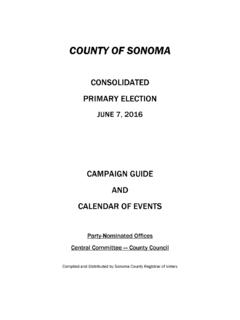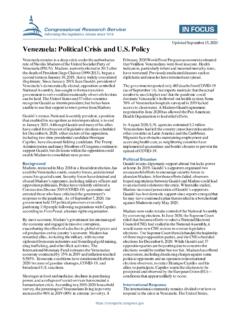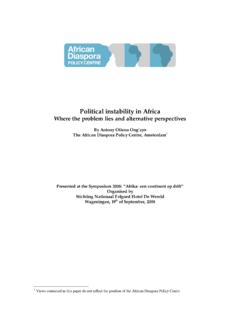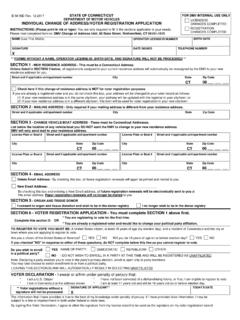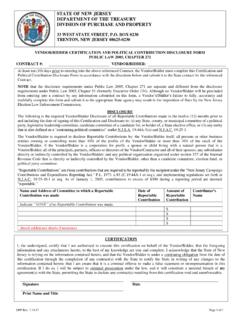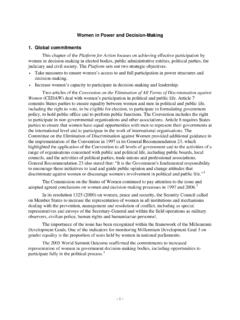Transcription of I. IRC 527 - POLITICAL ORGANIZATIONS
1 I. IRC 527 - POLITICAL ORGANIZATIONS 1. Introduction and Background Until 1975, the Code did not specifically address the tax status of POLITICAL ORGANIZATIONS , such as POLITICAL parties, campaign committees, and POLITICAL action committees (PACs). When the issue was addressed at all, their tax treatment was governed by Service administrative interpretations. Rev. Proc. 68-19, 1968-1 810, held that " POLITICAL funds" were not taxable to the candidate on whose behalf they were collected. The tax treatment of POLITICAL parties and committees, however, was not addressed until 1973, when the Service published Announcement 73-84, 1973-2 461.
2 In that announcement, the Service concluded that no specific provision in the Code justified its "long-standing practice" not to require POLITICAL ORGANIZATIONS to file returns and pay tax. Therefore, the investment income of POLITICAL parties and committees, including dividends, interest, and capital gains, was subject to tax. The announcement noted, however, that the Service would defer enforcement until Congress had given the problem specific consideration. Those rules set forth in Announcement 73-84 were restated in Rev.
3 Rul. 74 21, 1974-1 14, clarified in, Rev. Rul. 74-475, 1974-2 22. The revenue ruling concluded, on a prospective basis, that POLITICAL ORGANIZATIONS were not exempt from federal income tax, and would be taxed on interest, dividends, and capital gains from sales of securities, less deductible expenses directly attributable to producing that income. ORGANIZATIONS subject to tax were required to file Form 1120. As Announcement 73-84 indicates, the tax treatment of POLITICAL parties was being considered by Congress in 1973.
4 When then Secretary of the Treasury, George Schultz, appeared before the Ways and Means Committee in April 1973 to testify on tax reform, he discussed the need to spell out the rules on the taxation of POLITICAL parties. Congressional response was to enact IRC 527, effective for tax years beginning after December 31, 1974. IRC 527 provides that " POLITICAL ORGANIZATIONS " are subject to tax only to the extent provided for in that section. For all other purposes under federal law, they are treated as tax exempt ORGANIZATIONS .
5 IRC 527 imposes a tax on the " POLITICAL organization taxable income" of POLITICAL ORGANIZATIONS - broadly speaking, income from sources other than contributions, membership dues, and fundraising events. (For most POLITICAL ORGANIZATIONS this means income from passive investments such as interest, dividends, and capital gains.) Where otherwise exempt income is not used for the POLITICAL purposes that are the basis of these ORGANIZATIONS ' exemption, it is treated as " POLITICAL organization taxable income" as well. IRC 527 also establishes rules for when expenditures of funds by POLITICAL ORGANIZATIONS will be included in gross income of individuals.
6 Finally, it provides special rules for "newsletter funds" maintained by holders of and candidates for public office, and for IRC 501(c) ORGANIZATIONS that engage in POLITICAL activity. Effective October 1, 1988, the Exempt ORGANIZATIONS function of the Service assumed responsibility for interpreting and administering IRC 527. This article discusses IRC 527 as it relates to POLITICAL ORGANIZATIONS , and updates an article in the 1983 CPE text on 501(c) exempt ORGANIZATIONS and IRC 527. 2. "Exempt Function" A. Introduction The key concept in IRC 527 is that of "exempt function.
7 " (The term is defined in IRC 527(e)(2).) By definition, POLITICAL ORGANIZATIONS are entities that are organized and operated for the purpose of collecting contributions for or making expenditures for an "exempt function." Income from contributions, membership dues, POLITICAL fundraising events, and from the sale of campaign material must be set aside or spent for "exempt function" purposes or it is taxable to a POLITICAL organization . Finally, ORGANIZATIONS exempt under IRC 501(c) may be subject to tax on amounts spent directly on an "exempt function.
8 " B. What is "Exempt Function"? IRC 527(e)(2) defines "exempt function" as "the function of influencing or attempting to influence the selection, nomination, election, or appointment of any individual to any Federal, State, or local public office or office in a POLITICAL organization , or the election of Presidential or Vice-Presidential electors, whether or not such individual electors are selected, nominated, elected, or appointed." In determining whether an activity is part of an IRC 527 organization 's "exempt function," , the function of influencing or attempting to influence the selection process, one must examine the relationship between the activity and the purpose defined above.
9 The regulations divide exempt function activities (expenditures) into those that are "directly" and "indirectly" related to this purpose. "Directly related expenses" are defined in section (c)(1) of the regulations to include all activities directly related to and supporting the selection process. (The regulations use the term "selection process" to refer to the process of "influencing or attempting to influence the selection, nomination, election, or appointment of any individual to public office or office in a POLITICAL organization .)
10 " Reg. (c)(1). Section (d) of the regulations delineates when an office will be considered a "public office.") Generally, where an organization supports an individual's campaign for public office, its activities and expenditures in the campaign further the selection process. The individual need not be an announced candidate for the office; that he or she never becomes a candidate is not crucial. Reg. (c)(1). Thus, travel, lodging, and meal expenses incurred for a candidate traveling through a state to rally support for his or her election to public office in that state are expenditures for an exempt function.












